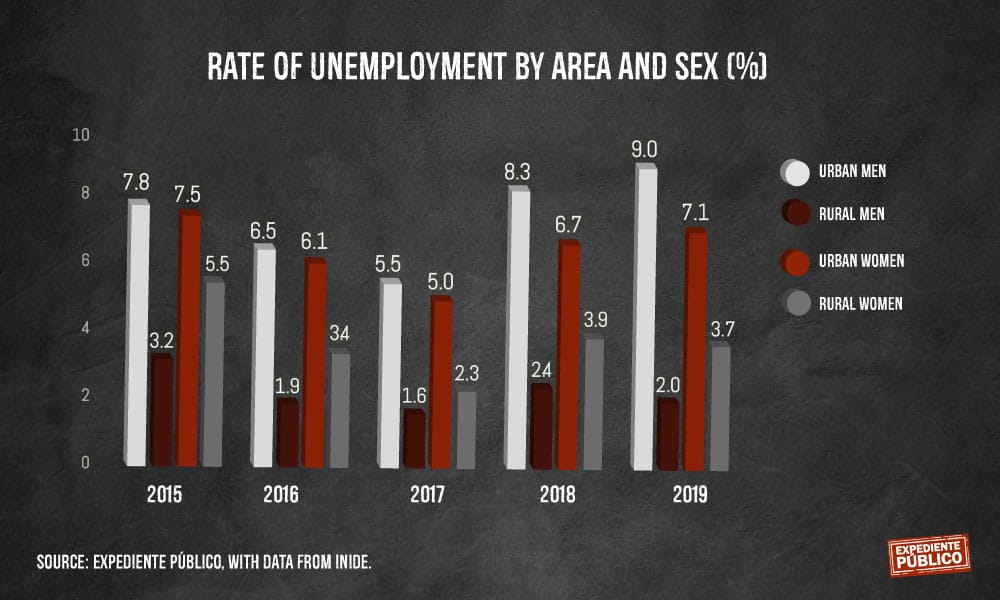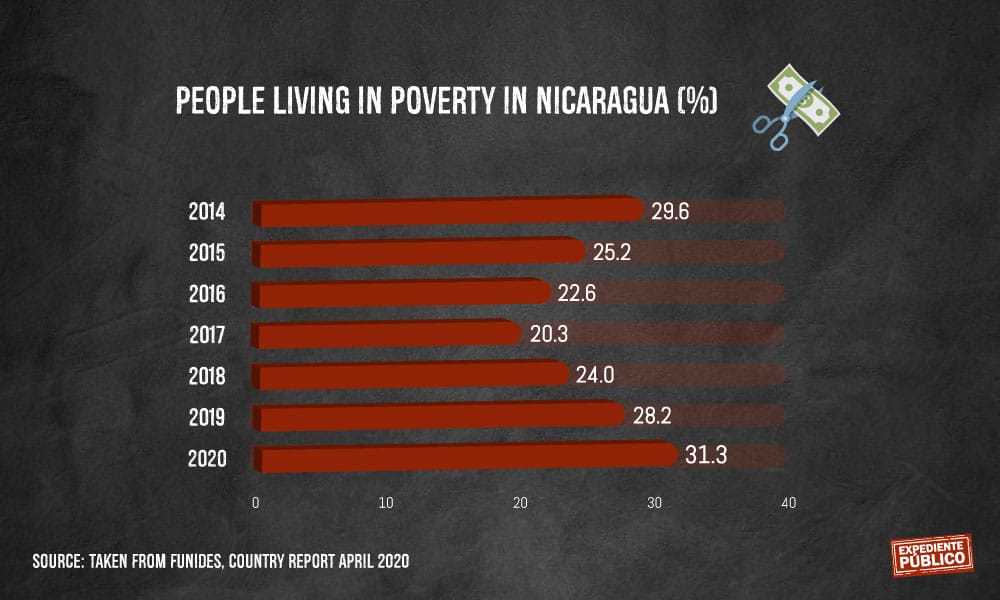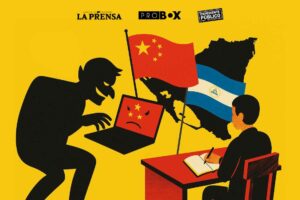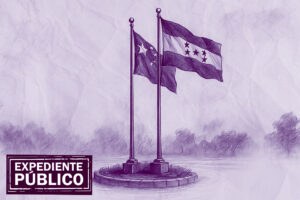In Nicaragua, the Sandinista government did not want to recognize or adopt measures to reduce the impact of COVID 19, this situation forced thousands of women to take their own measures in order to balance the need to protect their families and the need to survive economically.
In Nicaragua, the Sandinista government did not want to recognize or adopt measures to reduce the impact of COVID 19, this situation forced thousands of women to take their own measures in order to balance the need to protect their families and the need to survive economically.
Mariela Campos, fruit vendor at the Granada central market, lost her husband on May 17, 2020. The doctors said that he died from «severe atypical pneumonia,» a term used by the Ministry of Health to hide real Covid-19 figures, according to grievances from organizations and independent doctors.
Mariela and her husband had subsisted on the sale of basic grains and fruits for 30 years, however, with the death of the father of the family, her children began to help with the family business. The family continued working despite the spread of Coronavirus throughout the country. «It does not work in our favor to take the luxury of staying at home; we have to go out and pursue our daily bread; we have debts to pay, and the banks are not waiting for us,» emphasized Mariela to Expediente Público.
For women like Mariela, whether self-employed or in the informal sector, carrying out a quarantine meant being left without a source of income. In Nicaragua, the majority of the economically active population (EAP), estimated at 4 million, can be found in the informal sector, just like Mariela. Some other 755,000 people, 24.4% of the total EAP, have formal jobs with fixed incomes in the social security system.

“If we don’t work, we don’t eat”
Not only women in the informal sector suffer from economic losses and continue working despite the risk of getting sick. Karla Sánchez, a 46-year-old woman working at a printing plant in Managua, explains that sustaining their families does not mean disregarding health precautions, but does equivalate to new sacrifices. «Now, I do not go to the market anymore and have to go to the supermarket, which means that I incur more expenses. Before, I bought at least enough to get through the week, but now I only bring home enough for two days,» Sánchez manifests.
29-year-old Hazel Picado, supervisor of the production area of the printing plant where more than 10 women work, comments that the plant has taken health prevention measures in order to prevent the spread of the virus. «We use mouthpieces, masks, face guards, and hand sanitizer. We also change shifts, and it is totally prohibited to share drinking glasses,» sustained Picado. Picado added that private transportation has been provided so that workers can avoid public transportation. In spite of everything, working hours have been reduced due to the lack of production at the printing plant and, with that, income has also decreased.
Economist Néstor Avendaño explains in his blog that 46.9% of all of those employed worked less than 8 hours per day in the fourth quarter of 2019. «At least, it is very probable that the reduction of working hours in 2020 is equivalent to a loss of 200,000 full-time jobs and, in this sense, (the number) of unemployed persons, including the unworked hours of the underemployed, will be close to around 1,300,00 people out of an EAP of four million,» affirmed Avendaño to Expediente Público.
The Inter-American Development Bank (IDB) alerted that if the public health crisis in Nicaragua continues, more than 125,000 jobs could disappear in 2020. The poverty level in Nicaragua could rise to 36.9% in a worst-case scenario, surpassing 2019 figures of 28.2% and 2018 figures of 23.5%, according to projections from the Nicaraguan Foundation for Economic and Social Development (FUNIDES).

In Nicaragua, until the third trimester of 2019, the open unemployment rate for women had reached 5.7% at the national level, 7.1% in urban areas, and 3.7% in rural zones, according to data from the National Institute for Development Information (INIDE).
Official pandemic management: Far from public interest
Given the lack of preventative action and mitigation methods taken by the government in light of the pandemic, private sector leaders and organizations demanded concrete action from the Ortega-Murillo regime. For example, at the beginning of June, the Superior Council of Private Enterprise (COSEP) demanded a series of measures both administrative in nature and related to jobs, public health, relief and welfare programs, economic protection, and production.
Among the economic protection measures, private sector leadership suggested «the modification of norms corresponding to the Superintendence of Banks and Other Financial Institutions of Nicaragua (SIBOIF) and the National Commission of Microfinances (CONAMI), which favorably regulate the reclassification of debtors and mitigating factors to restructure personal loans, credit cards, mortgages, and SMEs, as well as access to better conditions for credit financing.»
In June, the first economic measures were taken by the government in order to combat the pandemic. For example, the government approved a 3% reduction in the domestic electricity rate, along with permits for financial institutions to readjust credits. On June 19, 2020, Parliament redirected an allocation of 11.7 million dollars to tend to the national emergency. This amount was originally granted by the Central American Bank of Economic Integration (BCIE) for infrastructure projects and was added to a 6-million-dollar Covid-19 fund part of the Ministry of Health’s budget.
The social cost of the pandemic
The novel Coronavirus is causing a global recession and affects women’s economies all over the world. The United Nations report: «Policy Brief: The Impact of Covid-19 on Women,» published on April 9, 2020, underscores that «women’s economic and productive lives will be affected disproportionately and differently from men. Across the globe, women earn less, save less, hold less secure jobs, are more likely to be employed in the informal sector.»
Female heads of households
Vilma Rodríguez, native of Jinotega, takes care of her mother and her four children: two with psychological problems and two with chronic asthma. She has also dedicated the last few years to caretaking and the protection of those with special needs.
Like Rodríguez, 28.1% of rural Nicaraguan households are headed by women, according to 2017 data from the International Foundation for Global Economic Challenges (FIDEG).
Thus far, Rodríguez has had to manage both working and supporting her family. For Rodríguez, it has been difficult to survive during a public health crisis without support from responsible authority members that care for the population. Rodríguez has frequently felt distressed because her expenses are greater than what she earns.
Congresswoman Azucena Castillo of the Nicaraguan Opposition points out that, due to authority members’ disregard for the rights and claims of women, women are increasingly excluded. «Although the government advocates for equality, this only occurs at a surface level and not does not exist in a substantive way,» indicates Castillo. For Castillo, the pandemic has exposed inequalities more than ever before, along with abuses and lack of respect for women’s rights. «The pandemic has shown that women find themselves in jobs that require great responsibility, as they take care of their families at home and those that are not their own. These jobs are the lowest paying and lack social benefits and sanitary conditions. Women are exposed to sickness and abuses at work. By ignoring the impact of gender in mitigation policies and the national response to the economic crisis, we can expect a setback in the fight for equality in Nicaragua,» concluded the congresswoman.





